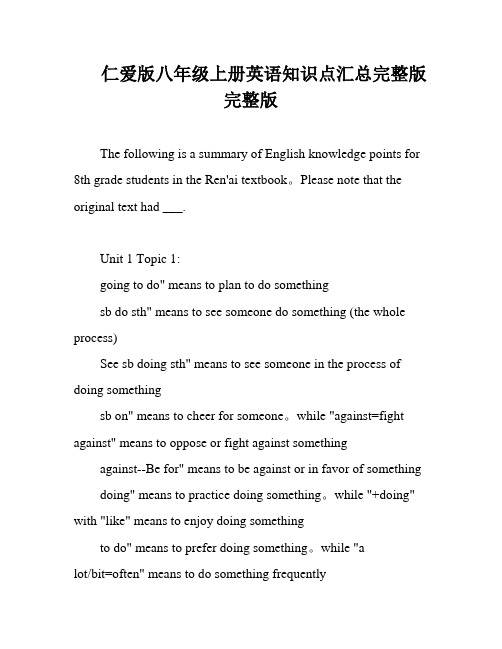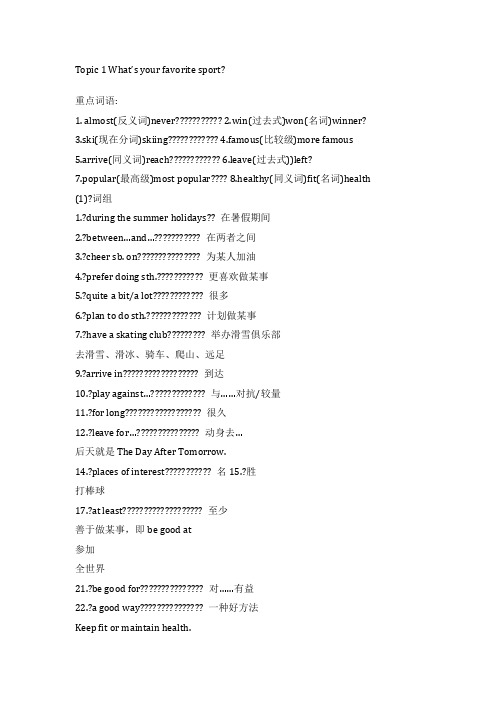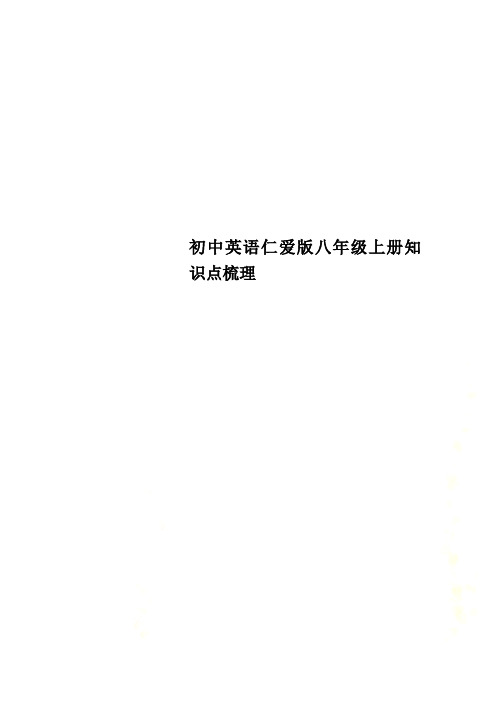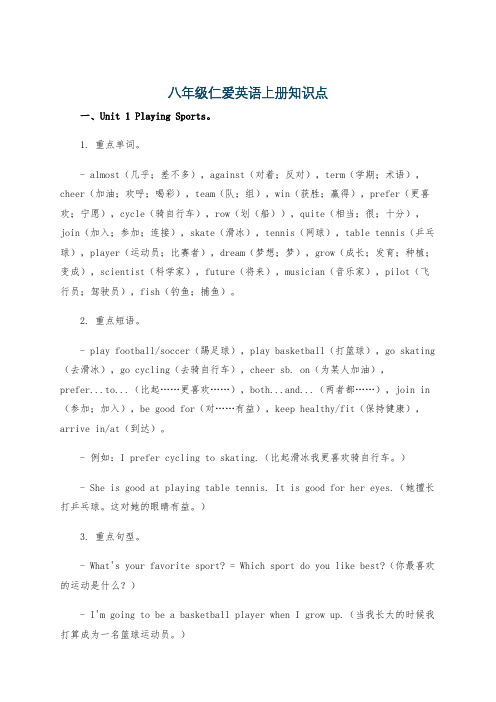初中英语仁爱版八年级上册知识点梳理共计完整版
仁爱版英语八年级上册知识点归纳

仁爱版英语八年级上册知识点归纳一、Unit 11.重点词汇:festival, custom, occasion, traditional, celebrate, annual, superstition2.语法:一般现在时和现在进行时3.重点句型:How do you celebrate the Spring Festival? I usually clean the house and have a big family dinner.二、Unit 21.重点词汇:adventure, explore, wander, journey, destination, route, scenery2.语法:一般过去时和过去进行时3.重点句型:We visited the Great Wall and took many photos.三、Unit 31.重点词汇:charity, donation, organization, fund, poverty, volunteer, campaign2.语法:情态动词can, could, may, might表请求、允许、建议、批准等3.重点句型:Can I join the charity bike ride? Sure, you can.四、Unit 41.重点词汇:weather forecast, hurricane, tornado, thunderstorm, lightning, disaster, rescue2.语法:虚拟语气3.重点句型:If I were you, I would take an umbrella because it may rain this afternoon.五、Unit 51.重点词汇:talent show, contestant, judge, round, applause, champion, performance2.语法:感叹句3.重点句型:What a wonderful performance!六、Unit 61.重点词汇:hobby, furniture, instrument, recipe, exhibition, display, masterpiece2.语法:动词不定式3.重点句型:She likes to play the piano in her free time.七、Unit 71.重点词汇:environment, pollution, recycle, global warming, carbon dioxide, emissions, alternative2.语法:虚拟语气3.重点句型:If we don't take action now, the environment will bein great danger.八、Unit 81.重点词汇:vacation, destination, souvenir, guidebook, sightseeing, journey, amodation2.语法:宾语从句3.重点句型:I want to know where you are going for vacation.以上是仁爱版英语八年级上册的知识点归纳。
仁爱版八年级上册英语知识点归纳

仁爱版八年级上册英语知识点归纳一、重点词汇1、动词:学习并掌握一些常用的动词,如“play”,“watch”,“read”,“study”,“eat”等。
这些动词是英语中最常用的词汇之一,它们可以组成很多常用的短语和表达方式。
2、名词:学习并掌握一些常用的名词,如“book”,“movie”,“music”,“food”,“sport”等。
这些名词可以用来描述各种事物和概念。
3、形容词:学习并掌握一些常用的形容词,如“happy”,“sad”,“angry”,“excited”,“bored”等。
这些形容词可以用来描述人的情感和感受。
4、代词:学习并掌握一些常用的代词,如“it”,“that”,“this”,“which”,“who”等。
这些代词可以用来代替名词,避免重复。
5、介词:学习并掌握一些常用的介词,如“in”,“on”,“at”,“before”,“after”等。
这些介词可以用来描述位置和时间关系。
二、语法要点1、一般现在时:掌握一般现在时的基本用法,包括肯定句和否定句,以及特殊疑问句的构成和回答方式。
一般现在时用来表示经常性、习惯性的动作或状态,以及客观事实或普遍真理。
2、现在进行时:掌握现在进行时的基本用法,包括肯定句和否定句,以及特殊疑问句的构成和回答方式。
现在进行时用来表示正在进行的动作或存在的状态。
3、情态动词:学习并掌握一些常用的情态动词,如“can”,“may”,“must”,“should”等。
情态动词用来表示可能性、能力、愿望、建议等含义。
4、祈使句:掌握祈使句的基本用法,包括肯定句和否定句。
祈使句用来表示请求、命令、建议等含义。
5、疑问句:学习并掌握一般疑问句和特殊疑问句的构成和回答方式。
疑问句用来提出问题,寻求信息。
6、并列句:学习并掌握并列句的构成和意思。
并列句由两个或两个以上的简单句组成,通过连词连接,表达相对独立而又相互关联的意思。
7、连词:学习并掌握一些常用的连词,如“and”,“but”,“or”,“so”,“because”等。
英语八年级上册仁爱版知识点归纳

英语八年级上册仁爱版知识点归纳以下是仁爱版八年级上册英语的部分知识点归纳:1. 重点短语how far 距离多远take a bus/subway 乘公交车/地铁get to school 到校on foot 步行ride a bike 骑自行车the way to 到……的路be late for 迟到go to the zoo 去动物园have a good time 玩得开心take a taxi 乘出租车the beginning of 在……的开始spend 花费(时间、金钱)half an hour 半小时2. 重点句型It takes sb. some time to do sth. 花某人多长时间做某事How far is it from …to… 从……到……有多远How long does it take sb. to do sth. 花费某人多长时间做某事3. 语法重点掌握频率副词always、usually、often、sometimes、never的用法。
掌握简单句的种类及陈述句的五种基本句型。
4. 交际用语能用简单的英语给他人提供问路和指路的帮助。
5. 词汇知识学习使用频度副词和表示距离远近的词。
6. 语音知识能根据读音规则和音标拼读单词。
7. 学习策略与情感态度积极与他人合作,共同完成学习任务。
在英语学习中乐于参与,积极配合同伴,乐于接触外国文化。
8. 文化意识了解英语交际中常用的体态语。
了解英语国家的饮食习俗,了解不同国家的节日及主要庆祝方式。
9. 词汇短语take off 起飞;脱掉;取消by the way 顺便说一下;顺便问一句look up (在词典、参考书中或通过电脑)查阅;抬头看;查找10. 重点句型及语法知识梳理:基本句型:主语+系动词+表语(S+V+P)例如:I feel happy.(主语I+系动词feel+表语happy)我感到高兴。
基本句型:主语+谓语(S+V)例如:They study hard.(主语They+谓语study)他们学习努力。
仁爱版八年级上册英语知识点汇总完整版完整版

仁爱版八年级上册英语知识点汇总完整版完整版The following is a summary of English knowledge points for 8th grade students in the Ren'ai textbook。
Please note that the original text had ___.Unit 1 Topic 1:going to do" means to plan to do somethingsb do sth" means to see someone do something (the whole process)See sb doing sth" means to see someone in the process of doing somethingsb on" means to cheer for someone。
while "against=fight against" means to oppose or fight against somethingagainst--Be for" means to be against or in favor of something doing" means to practice doing something。
while "+doing" with "like" means to enjoy doing somethingto do" means to prefer doing something。
while "alot/bit=often" means to do something frequentlywhat kind of" means which one。
(完整版)仁爱版英语八年级上知识点归纳

Topic 1 What’s your favorite sport?重点词语:1. almost(反义词)never2.win(过去式)won(名词)winner?3.ski(现在分词)skiing4.famous(比较级)more famous5.arrive(同义词)reach6.leave(过去式))left?7.popular(最高级)most popular 8.healthy(同义词)fit(名词)health (1)?词组1.?during the summer holidays?? 在暑假期间2.?between…and… 在两者之间3.?cheer sb. on 为某人加油4.?prefer doing sth. 更喜欢做某事5.?quite a bit/a lot 很多6.?plan to do sth. 计划做某事7.?have a skating club 举办滑雪俱乐部去滑雪、滑冰、骑车、爬山、远足9.?arrive in 到达10.?play against… 与……对抗/较量11.?for long 很久12.?leave for… 动身去…后天就是The Day After Tomorrow.14.?places of interest 名15.?胜打棒球17.?at least 至少善于做某事,即be good at参加全世界21.?be good for 对……有益22.?a good way 一种好方法Keep fit or maintain health.24.?relax oneself 放松某人自己重点句型你最喜爱的运动是什么?26.?Which sport do you prefer? = Which sport do you like better? 你更喜欢什么运动?I prefer skating. = I like skating better. 我更喜欢滑雪.你常滑雪吗?或Do you often skate?28.?She spends at least half an hour in the gym every day. 每天她至少花半小时在体育馆.29.?She plays baseball pretty well and she is also good at jumping.她棒球打得相当好而且擅长于跳.30.?What kind of sports do you like? = Which sport do you like? 你喜欢哪种运动? 重点语言点31.?see sb. do sth? “看见某人做了某事” 强调动作的全过程,常与every day; often 等连用.see sb. doing sth.? “看见某人正在做某事” 强调动作正在进行.I saw you play basketball almost every day during summer holidays.I often see him draw pictures near the river. 我常看见她在河边画画.I saw her go across the street.? 我看见她过了马路我看见她正在过马路。
仁爱版八年级上册英语知识点总结详细版

仁爱版八年级上册英语知识点总结详细版本文档总结了仁爱版八年级上册英语的知识点,以供参考。
Unit 1: Greetings and Introductions- Greetings: Hello, Hi, Good morning, Good afternoon, Good evening- Introduction: My name is..., I am from..., Nice to meet you, How are you?Unit 2: School Life- Subjects: English, Math, Science, History- Classroom objects: desk, chair, board, book, pen- School activities: study, read, write, listen, speakUnit 3: Family- Family members: father, mother, brother, sister- Relationships: parents, grandparents, siblings- Describing family members: tall, short, young, oldUnit 4: Hobbies and Interests- Hobbies: playing sports, listening to music, reading books- Leisure activities: watching movies, playing games, hanging out with friendsUnit 5: Food and Drinks- Food items: rice, noodles, chicken, beef, vegetables- Drinks: water, milk, tea, juiceUnit 6: Daily Routine- Daily activities: wake up, brush teeth, have breakfast, go to school - Time expressions: in the morning, in the afternoon, in the eveningUnit 7: Travel and Transportation- Modes of transportation: car, bus, train, bicycle- Travel destinations: city, beach, countrysideUnit 8: Holidays and Celebrations- Festivals: Christmas, Easter, New Year- Celebrations: birthday, wedding, graduation以上是仁爱版八年级上册英语的知识点总结,希望对你有所帮助!。
初中英语仁爱版八年级上册知识点梳理

初中英语仁爱版八年级上册知识点梳理八年级(上册)Unit 1 Play SportsTopic 1 Are you going to play basketball?Section A1.We are going to have a basketball game against Class Three.against表示“对着:反对;靠着”2.cheer sb.on为……加油,鼓劲3.win和beat都可表示“赢”,但用法不同。
(1) win(won,won)一般后接比赛,奖品或奖项作宾语,也可作不及物动词,表示“赢”的结果。
(2) beat(beat,beaten)击败、战胜,一般接对手作宾语,还可译为“心脏跳动”或“击打”。
a game a teamwin+事物 a war beat+对手 a nationa prize an apponent(对手)4.prefer宁愿,更喜欢(1)prefer doing sth.to doing sth.跟做某事比较起来更喜欢做某事prefer sb./sth.to sb./sth.跟某人/某物比较起来更喜欢人/某物1.Spen, take, cost 与pay的区别复习指南(p34)2.do exercise=play sports做运动,锻炼3.There be句型的将来时结构为There is/are going to be或There will be。
注意在There be句型中不能出现表示“有”的have和has。
4.the high jump跳高the long jump跳远5.Sure (1)be sure that+从句e.g.I am sure that he is right.(2)sb.be sure to do sth.某人一定会做某事。
强调说话人的语气。
(3)be sure of/about sth./doing sth.“确信”,表示主语对……有把握。
仁爱版八年级上册英语知识点汇总(完整版).doc

八年级上学期英语知识点八年级英语短语总汇Unit1 Topic1going to do 打算做某事sb do sth 看见某人做某事(全过程)See sb doing sth 看见某人正在做某事(正在进行)sb on 为... 加油against=fight against 与... 对抗 / 大战against--Be for 反对—赞同+doing 练习做... +doing 跟喜欢 ...+doing/ doing/n. 比起后者跟喜欢前者to do 宁愿做 ... a lot/bit=often 经常=what kind of 那一个 ;prefer=like better 跟喜欢10. Join+ 某人 / 组织Join in+ 活动 / 比赛加入Take part in+ 活动 / 比赛Be in+ 活动/比赛about... 知道 / 了解有关于...14.时间状语从句:主句(一般将来时)从句(一般现在时) when后是从句,前是主句15.It takes sb+时间/钱to do sthSpend+ 时间 / 钱+(in) doing sth在某方面花费多少Spend+时间 / 钱+on+n.物+cost+ 时间 / 钱be going to be=there will be这里将会有...good at+(doing)sth=Do well in+(doing)sth 擅长做... sure that+ 宾语从句确信 ... sure to do 肯定要做... sure of/about 对... 有把握the weekend 在周末sb/sth+adj使... 处在什么状态+adj 保持 ...;keep sb/sth+adj 使 ... 保持什么状态way to 一种 ... 的方法oneself 使某人自己放松for 为... 效力in=get to=reach+ 大地方;Arrive at+ 小地方(人); exciting for动身做某地(物);leave A for B 离开A 地去B地Unit1 Topic2you(not)....=cuold/would you please(not)do=would/do youmind(not)doing=Would you mind (not)+if+ 从句ill=be ill 生病of+n. 复数... 其中之一+doing 继续做;keep on doing 反复做(有间隔)sb.=give sb a hand 帮助某人.+ 间宾(人)+直宾(物)=V.+直宾 +to/for+ 间宾=certainly=of course 当然at all=certainly not=of course not 不介意mind=it ’s nothing=it ’s doesn ’ t matter 没关系...around/about 乱扔. 修饰不定代词放其后sorry for/about.... 对... 感到内疚do you mean by...=what does...mean=what ’s the meaning of... 意思是什么at sb. 斥责某人try one ’s best to do sth 尽某人做大的努力做某事angry with sb. For doing sth 因为某人做某事而生气angry at/about sth 因某事而生气angry with 因 ... 而生气the help of sb.=with one ’help 在某人的帮助下...to sb. 对某人说...into being=be born 形成 / 产生...that... 如此 ... 以致 ...=to...too... 太 ... 而不能...century=one hundred year 一个世纪=more than 超过( 中间 )=aross( 表面 )通过...through... 通... 扔...;throw...into... 把... 扔/ 投入 ... ...from doing 阻止 ... 做某事’ s + adj +(for sb.)+to do (对某人来说)做... 是...+基数词又一,在一;other +n. 复数另外的=all over 到处for...只是为了......into...使...变成...around围坐在from doing得到...as后不可列出前面所提过的所有东西number of+n.可数复数许多的;the number of+n.单数...的数量复数( Pl. ) heroesUnit1 Topic31.连字符后不加 s2.名词作定语修饰名词一般用单数形式,但 sport ,woman用复数fun=enjoy oneself=have a good time玩的开心fun+doing 做某事有趣’ s one ’ s 序数词time to do 是某人第几次做某事get ready for=perpare for 为... 作准备friends with sb. 和... 交朋友in=be at home 在家用于第一人称 I ,We(一般用于疑问句 ) will用于全部人称it + 时间约定在几点,不加at a message 捎个口信the school gate 在学校大门;at the theater 在剧场;at the bus stop 在公交站up with 赶上 ... and neck 肩并肩into 撞到symbol of ... 的象征for 代表 ...+一段时间每隔多久sth in turn 轮流做某事’ s one ’ s turn to do 轮到某人做某事the chance to do sth 有机会做某事the 序数词time 第几次first place 获得第一名,考试/ 比赛获得名次时序数词前不可加the day (将来)=one day (过去、将来)某一天(本身具有)=be able to (后天努力达到的)能够exercise=do sports 锻炼( 过程 );hear( 结果) 听a message 发信息...as 把... 当做Unit2 Topic11. Have the flu 患流感 ;Have a sore throat 喉咙痛2. What’s the matter(whith sb.)/what ’s wrong(with sb.) (某人)怎么了3. Boiled water 开水4. Stay in 待在5. Too much +n. 不可数 /too many +n. 可是太多 ;much too+ adj./adv. 太...6. In the sun 在阳光呀7. Take/have some medicine 吃药8. Take... to... 带... 去...9. Brush one ’s teeth 刷某人的牙to 发生a taxi 打的after=take care of 照顾for+ 时间’ s leave 请几天的假after/take care of +oneself 照顾某人自己worried about=worry about 担心( 时间点 )/while( 时间段 ) 当... 的时候Unit2 Topic21. Ask sb. to do sth 请求某人做某事2. Give up +doing 放弃做某事3.系动词 +adj.= 系表4. 动名词做主语,谓语用第三人称单数4. Stay up 熬夜...into... 把 ... 放 ...5. Be bad for 对... 有益 ;be good for 对... 有害6. On the newspaper (表层) ;in the newspaper (内容)7. Show sth. to sb. 向某人展示某物没有 -- 有careful (not) to do 注意(不)做sb. to do强迫某人做某事to do不得不做sb./sth do sth让某人/某物做某事surprised to do 惊讶地做...surprised at 对... 感到惊讶one's surprise 使某人惊奇的是a bath洗澡;take a shower淋浴public在公共场所soon as possible尽可能快地(放在句末)only...but also... 不但 ... 而且 ...22. 西红柿,马铃薯,英雄,黑人复数( Pl. )加esto do 需要做某事to 跑向piece of advice 一条建议mad 发疯soon as... 一... 就Unit2 Topic3sb. up 增强某人的体质answer the question问/回答问题the time=always 一直away from=get away from=stay away from 远离once=right now=right away 立刻one ’s advice 采纳某人的建议 ;give sb. advice 给某人建议sb. for advice 向某人寻求意见:May... B:Yes,...may/ No,mustn ’t:Must... B:Yes,...must/No,...needn ’t=don ’t/doesn ’t have to=at last=in the end 最后I speak to... 我能和 ... 讲话吗sb. up=call sb.=telephone/phone sb.=give sb. a calla message 留言sb. (not) to do 告诉某人(不要)做to do 忘记做过什么(已做) ...;forget doing sth 忘记做某事(还没做)a talk(to sb.) (给某人)做报告 sth by oneself 某人亲自做away from +doing 远离 ... no to +doing 对... 说不order to 为了 ... up 热身of +doing 代替做 ...right to do sth 有权做某事over 飞过after 追赶up/down 向上/向下afraid of+ (doing )sth 害怕 ( 做) 某事 =be afraid to do 害怕做某事Unit3 Topic1one ’s free/spare time在某人空闲的时间not=why don ’ t you为什么不...3.表示喜欢的词都加ingto music 随着音乐跳舞be 可能是 ; can be可以是;must be应该是...from...从...学习...;learn from...从中学习started着手开始begin with...以...开始out 剪下...to...把...粘贴在...sth to sb.与...分享...to do过去常常做某事;get/be used to doing习惯于做某事is fun to do/doing做是很有趣的warm保暖be 也许是(系表结构); maybe也许(副词,放在句首)sb. With sth=provide sth. For sb.为某人提供某物。
八年级仁爱英语上册知识点

八年级仁爱英语上册知识点一、Unit 1 Playing Sports。
1. 重点单词。
- almost(几乎;差不多),against(对着;反对),term(学期;术语),cheer(加油;欢呼;喝彩),team(队;组),win(获胜;赢得),prefer(更喜欢;宁愿),cycle(骑自行车),row(划(船)),quite(相当;很;十分),join(加入;参加;连接),skate(滑冰),tennis(网球),table tennis(乒乓球),player(运动员;比赛者),dream(梦想;梦),grow(成长;发育;种植;变成),scientist(科学家),future(将来),musician(音乐家),pilot(飞行员;驾驶员),fish(钓鱼;捕鱼)。
2. 重点短语。
- play football/soccer(踢足球),play basketball(打篮球),go skating (去滑冰),go cycling(去骑自行车),cheer sb. on(为某人加油),prefer...to...(比起……更喜欢……),both...and...(两者都……),join in (参加;加入),be good for(对……有益),keep healthy/fit(保持健康),arrive in/at(到达)。
- 例如:I prefer cycling to skating.(比起滑冰我更喜欢骑自行车。
)- She is good at playing table tennis. It is good for her eyes.(她擅长打乒乓球。
这对她的眼睛有益。
)3. 重点句型。
- What's your favorite sport? = Which sport do you like best?(你最喜欢的运动是什么?)- I'm going to be a basketball player when I grow up.(当我长大的时候我打算成为一名篮球运动员。
仁爱版英语八年级上册知识点归纳总结

仁爱英语八年级上册知识点归纳1、see sb. do sth.看见某人做了某事;强调看见动作的全过程,现在动作已结束。
see sb. doing sth.看见某人正在做某事,强调动作正在进行。
2、cheer sb. on 为某人喝彩3、prefer...to...比起...更喜欢...4、join 加入,参加。
意为“加入某人或组织”。
join in意为“加入某项活动”其同义词组为be in; take part in5、go mountain climbing去爬山6、sb. spend some time+ on sth./(in) doing sth.花费时间在某事上/做某事It takes sb. some time to do sth.花费某人时间做某事7、exercise:a.作为可数名词,意为“体操,练习,功课”。
E.g. I do morning exercises every day.b.作为不可数名词,意为“锻炼,运动” E.g. Exercise makes us strong.c.作为动词,意为“锻炼,训练” E.g. She exercises every morning.8、be good at; do well in 擅长...;在...做的好be not good at; be weak in; do badly in 在...方面薄弱9、 the high jump跳高;the long jump 跳远10、all over the world; throughout the world; around the world; the whole world 全世界11、be good for对...有益/有好处;反义词短语be bad for12、keep fit/healthy 保持健康13、one of+ the+最高级+可数名词的复数,表示“最...的之一”14、fall ill生病15、be glad to...乐意做...16、do one’s best=try one’s best意为“尽力,努力”17、be angry with sb.生某人的气18、keep doing sth.继续做某事在某人的帮助下19、with the help of sb.=with one’s help以便,为了”so...that...如此...以至于...20、so that “21、more and more 越来越22、sports meet 运动会23、stand for 代表24、in the future 在将来25、What’s wrong with you?其同义句为What’s the matter/trouble with you?你怎么啦?26、I’m sorry +动词不定式,“为...感到抱歉/难过”27、have a cold感冒;have a cough咳嗽;have a headache头痛;havea stomachache胃痛,肚子痛28、at night在夜里;in the evening在傍晚29、have a rest=take a rest休息30、feel like doing sth.=would like to do sth.想做某事31、too much修饰不可数名词,还可用来修饰动词too many修饰可数名词的复数形式很,太”,用来修饰形容词或副词much too “32、lie down 躺下33、something new 新的事something, anything, nothing等不定代词,被形容词修饰时,形容词谓语其后作后置定语34、three times a day一天三次35、have an accident发生一场事故36、take care of+名词/代词,意为“照顾,照看,保管”37、return to sp.返回某地。
(完整版)仁爱版八年级上册英语知识点汇总(完整版)

八年级上学期英语知识点八年级英语短语总汇Unit1 Topic11.be going to do 打算做某事2.See sb do sth看见某人做某事(全过程)See sb doing sth看见某人正在做某事(正在进行)3.cheer sb on为...加油4.Play against=fight against 与...对抗/大战5.Be against--Be for 反对—赞同6.practice+doing 练习做...7.Prefer+doing 跟喜欢...Prefer doing to doing 或比起做后者,更喜欢做前者Perfer to do, quite a lot/bit/often.Which one do you prefer, which kind of that?10. Join+某人/组织Join in+活动/比赛加入Take part in+活动/比赛Be in+活动/比赛13.Know about... 知道/了解有关于...当时间来临时,我们将采取行动;这是我们的计划。
15. It takes sb+时间/钱 to do sthSpend+时间/钱+(in) doing sth 在某方面花费多少Spend+时间/钱+on+n.物+cost+时间/钱16.There be going to be=there will be 这里将会有...17.Be good at+(doing)sth=Do well in+(doing)sth 擅长做...18.Be sure that+宾语从句确信... 19.Be sure to do 肯定要做...20.Be sure of/about 对...有把握 21.At the weekend 在周末22.Make sb/sth+adj 使...处在什么状态23.Keep+adj 保持...;keep sb/sth+adj 使...保持什么状态24.A way to 一种...的方法 25.Relax oneself 使某人自己放松26.Play for 为...效力27.Arrive in=get to=reach+大地方;Arrive at+小地方28.Excited(人);exciting(物)29.Leave for动身做某地;leave A for B 离开A地去B地Unit1 Topic21.Could you(not)....=cuold/would you please(not)do=would/do youmind(not)doing=Would you mind (not)+if+从句2.fall ill=be ill 生病其中之一是n的复数形式.优化后的文本可以是:Use 'keep doing' for continuous action and 'keep on doing' for repeated action with intervals.5.Help sb.=give sb a hand 帮助某人6.V.+间宾(人)+直宾(物)=V.+直宾+to/for+间宾7.Sure=certainly=of course 当然8.Not at all=certainly not=of course not 不介意9.Never mind=it’s nothing=it’s doesn’t matter 没关系乱扔11.Adj.修饰不定代词放其后12.Be sorry for/about.... 对...感到内疚13.What do you mean by...?=what does...mean?=what’s the meaning of...?意思是什么?14.Shout at sb. 斥责某人15.Do/try one’s best to do sth 尽某人做大的努力做某事16.Be angry with sb. For doing sth 因为某人做某事而生气17.be angry at/about sth 因某事而生气18.be angry with 因...而生气19.With the help of sb.=with one’help 在某人的帮助下20.Say...to sb. 对某人说...e into being=be born 形成/产生22.So...that... 如此...以致...=to...too... 太...而不能...23.A century=one hundred year 一个世纪24.Over=more than 超过25.Through(中间)=aross(表面) 通过阻止他们从做28.It’s + adj +(for sb.)+to do (对某人来说)做...是...29.Another+基数词又一,在一; other +n.复数另外的Around=all_over 处到处31.Just for...只是为了...32.Turn...into... 使...变成...33.Sit around 围坐在34.Get from doing 得到...35.Such as 后不可列出前面所提过的所有东西36.A number of+n.可数复数许多的;the number of+n.单数 ...的数量37.Hero 复数(Pl.) heroesUnit1 Topic31.连字符后不加soman则例外,需用复数。
英语八上知识点总结仁爱版

英语八上知识点总结仁爱版英语八上是初中英语学习的重要阶段,本篇文章将为您详细总结仁爱版英语八上的知识点,帮助您巩固所学,提高英语水平。
一、词汇部分1.名词:学习了一般名词、专有名词、可数名词和不可数名词的用法。
2.冠词:掌握了不定冠词a/an的用法,以及定冠词the的用法。
3.代词:学习了人称代词、物主代词、指示代词、反身代词、疑问代词和不定代词的用法。
4.形容词:学习了形容词的比较级和最高级,以及一些常用形容词的用法。
5.副词:学习了副词的比较级和最高级,以及一些常用副词的用法。
6.动词:学习了动词的时态、语态、非谓语动词等知识点。
7.介词:掌握了常用介词的用法,如in、on、at、by、with、for、from 等。
8.连词:学习了并列连词、从属连词的用法,如and、but、or、because、if、although等。
二、句型部分1.疑问句:学习了一般疑问句、选择疑问句、特殊疑问句和反意疑问句的构成及用法。
2.祈使句:掌握了祈使句的肯定式和否定式。
3.感叹句:学习了由what和how引导的感叹句。
4.简单句:巩固了主谓宾、主系表句型,学习了There be句型。
5.并列句:掌握了由并列连词连接的并列句。
6.复合句:学习了由从属连词引导的宾语从句、状语从句、定语从句等。
三、语法部分1.动词时态:学习了现在进行时、一般过去时、一般将来时、现在完成时等时态。
2.被动语态:掌握了被动语态的构成和用法。
3.句子结构:学习了简单句、并列句、复合句的构成。
4.状语从句:学习了时间状语从句、地点状语从句、原因状语从句、条件状语从句等。
5.定语从句:学习了关系代词和关系副词的用法。
四、阅读与写作1.阅读理解:学习了如何根据文章内容回答问题,提高阅读理解能力。
2.写作:掌握了书信、日记、看图作文等写作技巧。
总结:通过学习仁爱版英语八上的知识点,希望大家能够扎实掌握英语基础,为今后的英语学习打下坚实基础。
在复习过程中,注意查漏补缺,提高自己的英语水平。
(完整版)仁爱版八年级上册英语知识点总结.doc

八年级上英语语法1) leave 的用法1.“leave+地点”表示“离开某地”。
例如:When did you leave Shanghai?你什么时候离开上海的?2.“leave for+地点”表示“动身去某地”。
例如:Next Friday, Alice is leaving for London.下周五,爱丽斯要去伦敦了。
3.“leave+地点 +for+ 地点”表示“离开某地去某地”。
例如:Why are you leaving Shanghai for Beijing?你为什么要离开上海去北京?2)情态动词 should“应该”学会使用should 作为情态动词用,常常表示意外、惊奇、不能理解等,有“竟会”的意思,例如:How should I know? 我怎么知道?Why should you be so late today? 你今天为什么来得这么晚?should 有时表示应当做或发生的事,例如:We should help each other我.们应当互相帮助。
我们在使用时要注意以下几点:1.用于表示“应该”或“不应该”的概念。
此时常指长辈教导或责备晚辈。
例如:You should be here with clean hands.你应该把手洗干净了再来。
2.用于提出意见劝导别人。
例如:You should go to the doctor if you feel ill. 如果你感觉不舒服,你最好去看医生。
3. 用于表示可能性。
should 的这一用法是考试中常常出现的考点之一。
例如:We should arrive by supper time. 我们在晚饭前就能到了。
She should be here any moment.她随时都可能来。
31. what 与 which 都是疑问代词,都可以指人或事物,但是 what 仅用来询问职业。
如:What is your father?你父亲是干什么的?该句相当于:What does your father do?What is your father's job?Which 指代的是特定范围内的某一个人。
仁爱版八年级上册英语知识点总结

八年级上英语语法1) leave的用法1.“leave+地点”表示“离开某地”。
例如:When did you leave Shanghai你什么时候离开上海的?2.“leave for+地点”表示“动身去某地”。
例如:Next Friday, Alice is leaving for London.下周五,爱丽斯要去伦敦了。
3.“leave+地点+for+地点”表示“离开某地去某地”。
例如:Why are you leaving Shanghai for Beijing你为什么要离开上海去北京?2) 情态动词should“应该”学会使用should作为情态动词用,常常表示意外、惊奇、不能理解等,有“竟会”的意思,例如:How should I know 我怎么知道?Why should you be so late today 你今天为什么来得这么晚?should有时表示应当做或发生的事,例如:We should help each other.我们应当互相帮助。
我们在使用时要注意以下几点:1. 用于表示“应该”或“不应该”的概念。
此时常指长辈教导或责备晚辈。
例如:You should be here with clean hands. 你应该把手洗干净了再来。
2. 用于提出意见劝导别人。
例如:You should go to the doctor if you feel ill. 如果你感觉不舒服,你最好去看医生。
3. 用于表示可能性。
should的这一用法是考试中常常出现的考点之一。
例如:We should arrive by supper time. 我们在晚饭前就能到了。
She should be here any moment. 她随时都可能来。
31. what 与which 都是疑问代词,都可以指人或事物,但是what仅用来询问职业。
如:What is your father 你父亲是干什么的?该句相当于:What does your father doWhat is your father's jobWhich 指代的是特定范围内的某一个人。
初中英语仁爱版八年级上册知识点梳理(共计59页)-c75a1c78852458fb770b56c0

初中英语仁爱版八年级上册知识点梳理(共计59页)-c75a1c78852458f b770b56c0-CAL-FENGHAI.-(YICAI)-Company One1八年级(上册)Unit 1 Play Sports【考点解析】Topic 1 I'm going to play basketballSection A1.We are going to have a basketball game against Class Three.against表示“对着:反对;靠着”。
e. g.We are all against him.【例1】(10年通化中考)Mr. Black is strongly_______ keeping animals in the zoo,because he thinks animals should also have the right to enjoy freedom.A.up B.for C.against D.down2.cheer sb.on为……加油,鼓劲【例2】—Our class will have a basketball match with Class Two tomorrow.—That sounds exciting. I’ll go and_________.A.cheer on you B.cheer you on C.cheer up you D.cheer you up3.win和beat都可表示“赢”,但用法不同。
(1) win(won,won)一般后接比赛,奖品或奖项作宾语,也可作不及物动词,表示“赢”的结果。
(2) beat(beat,beaten)击败、战胜,一般接对手作宾语,还可译为“心脏跳动”或“击打”。
a game a teamwin+事物 a war beat+对手 a nationa prize an apponent(对手)e.g. In the 29th Olympic Games,Phelps beat the other suimmers and won 8 gold medals himself. 在第29届奥运会上,菲尔普斯战胜其他游泳运动员,一人独获8金。
- 1、下载文档前请自行甄别文档内容的完整性,平台不提供额外的编辑、内容补充、找答案等附加服务。
- 2、"仅部分预览"的文档,不可在线预览部分如存在完整性等问题,可反馈申请退款(可完整预览的文档不适用该条件!)。
- 3、如文档侵犯您的权益,请联系客服反馈,我们会尽快为您处理(人工客服工作时间:9:00-18:30)。
初中英语仁爱版八年级上册知识点梳理共计 HUA system office room 【HUA16H-TTMS2A-HUAS8Q8-HUAH1688】八年级(上册)Unit 1 Play Sports【考点解析】Topic 1 Are you going to play basketball?Section A1.We are going to have a basketball game against Class Three.against表示“对着:反对;靠着”2.cheer sb.on为……加油,鼓劲3.win和beat都可表示“赢”,但用法不同。
(1) win(won,won)一般后接比赛,奖品或奖项作宾语,也可作不及物动词,表示“赢”的结果。
(2) beat(beat,beaten)击败、战胜,一般接对手作宾语,还可译为“心脏跳动”或“击打”。
a game a teamwin+事物 a war beat+对手 a nationa prize an apponent(对手)4.prefer宁愿,更喜欢(1)prefer doing sth.to doing sth.跟做某事比较起来更喜欢做某事prefer sb./sth.to sb./sth.跟某人/某物比较起来更喜欢人/某物(2)prefer to do sth.(rather)than do sth.跟做某事比较起来更喜欢做某事(3)prefer to do sth.更喜欢做某事5.join/take part in(1)join参加某个政党,团体,组织等,成为其中的一员(2)join sb.(in doing sth.)和某人一起(做某事)(3)join in=take partin参加某项活动Section B1.play for a team为某队效力be in/on the team在某队打球2.dream作名词,“梦,梦想”。
e.g.my dream job也可作动词dream of/about sth./doing sth.3.“one of the+形容词最高级+名词的复数”意思是“最……之一”。
4.break the record打破记录5.in the 2008 Beijing Olympics在2008年北京奥运会中。
“在……比赛中”用ine.g.in the race/in the basketball game6.give up放弃。
注意应该把介词放在中间。
e.g.give it up,give up doing sth.放弃做某事。
7.What a Shame=What a pity真遗憾!Section C1.spend/cost/pay/take(1)spend作“花费”之意时,指花费时间/精力/财力在某事或某物上,主语是人。
(2)cost主要指花费金钱/时间/劳力/精力等。
主语是某物或某事。
其结构是sth.costs sb….(3)pay sb,酬谢某人,pay…for…可等同于spend…on…,或用cost作同义句转换。
(4)take一般指花费时间,其主语是名词或动名词,经常用it作形式主语。
2.do exercise=play sports做运动,锻炼3.There be句型的将来时结构为There is/are going to be或There will be。
注意在There be句型中不能出现表示“有”的have和has。
4.the high jump跳高 the long jump跳远5.Sure (1)be sure that+从句e.g.I am sure that he is right.(2)sb.be sure to do sth.某人一定会做某事。
强调说话人的语气。
(3)be sure of/about sth./doing sth.“确信”,表示主语对……有把握。
(4)用在祈使句里Be sure(not)to do sth.一定(不)做某事 e.g.Be sure to come here early.6.make的用法。
(1)make sb.do sth.使某人做某事。
被动语态中要还原to。
(2)“make sb./sth.+形容词”使某人或某物处于某种状态。
(3)make sth.for sb.—make sb.sth.为某人制作……7.be good for“对……有益”,反义词组是be bad for“对……有害”。
8.keep healthy=keep fit保持健康Section D1.play against跟……进行比赛play with/play against/play for play with玩耍,游戏,玩乐,与……玩耍。
play against同……比赛。
play for为……效力。
2.leave…for…离开某地去某地leave for=set off for出发去某地.3.一般将来时(1)含义:表示将来某个时间要发生的动作或是存在的状态,也表示将来经常或反复发生的动作,常与表示将来的时间状语连用,如:tomorrow,soon,later on,next time(week,month,year,Sunday…)等。
(2)结构为be going to do sth.或will do sth.。
There be句型的将来时结构为There is/are going to be或There will be。
注意在There be句型中不能出现表示“有”的have/has。
(3)表示位置移动的动词go, come,leave,fly,start等可以用现在进行时表示将要发生的事。
其中go和come一定要用现在进行时表示将来。
【例19】(10年河北中考)This term________ over.The summer vacation is coming in two weeks.A.is B.was C.has been D.will be【例20】(10年重庆中考)If you___________ to the 2010 Shanghai Expo next week,I will go with you.A.go B.has gone C.will go D.are going【考点解析】Topic 2 Would you mind passing me some water?Section A1.would/could/will you(please)do sth.“请你做……好吗?”表示委婉请求对方做某事,否定结构是would/could/will you(please)not do sth.。
e.g.Would you please not play the piano loudly?2.fall ill“生病”,be ill“生病的”,强调一种状态。
feel ill“感觉不舒服”,强调一种身体感受。
fall down摔倒,跌倒。
3.mind的用法(1)作动词,表示“介意”,常用于疑问句或否定句中。
其结构是mind sb./sth./doing sth.对would you mind sb./sb.'s doing sth.及“would you mind if+从句”的回答,如果是表达“会介意”,可用Yes,you'd better not./I am sorry but I do.如果表达“不会介意”,可用No,not at all./Never mind./It doesn't matter./No,of course not.(2)用于提出建议。
Would you mind doing sth./would you mind not doing sth 对Would you mind doing sth.的回答可以用Of course not,I will do it right away./Sorry.I will do it right away.对would you mind not doing sth.的回答可以用Sorry,I won't do it again./I'm sorry about that.(4)作名词,“思想”。
set one's mind to do sth./on sth.专注于做某事 4.be glad/happy to do sth.乐意做某事5.practice sth./doing sth.练习做某事Section B1.be always doing sth.老是……,含有抱怨的感情色彩。
2.careless形容词,反义词是careful。
carelessly副词,反义词是carefully. 3.chance机会have a chance to do sth.有机会做某事get a chance to do sth.得到一个机会做某事4.What do you mean by sth./doing sth.=What's the meaning of sth./doing sth.5.shout at sb.朝某人喊叫,含有生气或气愤的感情。
shout to sb.朝某人喊叫,只是为了使对方听到,没有感情色彩。
6.fight with sb.=have a fight with sb.与某人打架7.be angry with sb.意为“生某人的气”,如:【链接】(1) be angry at 对某人的言行感到气愤,(2) be angry about sth. 对某事感到生气,如:8.do one's best to do sth.=try to do sth.尽力做某事9.say sorry/hello/goodbye to sb.向某人道歉/问候,/道10.be/feel sorry for/to do为……而抱歉(难过)11.keep的用法(1) keep sb.doing sth.使某人一直做某事(2)“keep sb./sth.+宾补+adj.”使某人/某物处于某种状态(3)“keep sb./sth.+宾补+adv.”使某人/某物处于某种状态 (4)keep doing sth.继续不断做某事e. (5)“keep+表语”,表示保持/继续(处于某种状态) e.g.keep fit/healthy(6)赡养e.g.My father keeps a big family.(7)保存,保留e.g.How long can I keep the book?12.turn down调低音量turn up调高音量turn on打开turn off关上注意代词都要放在中间。
